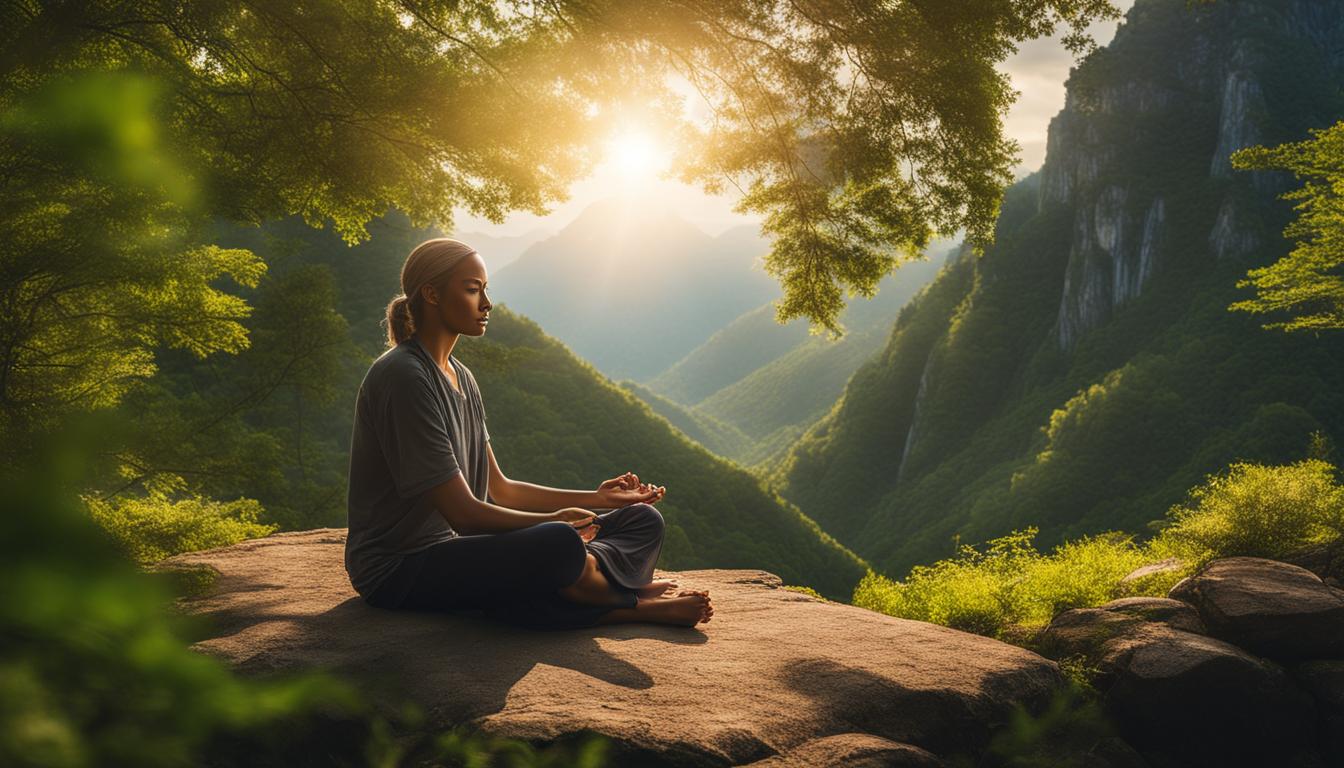In today’s fast-paced and chaotic world, finding inner peace and tranquility may seem like an elusive goal. However, achieving a state of serenity and calmness is possible, and it doesn’t require meditating on a mountaintop or attending expensive wellness retreats. Inner peace can be cultivated within ourselves, tapping into the deep reservoir of peacefulness and serenity that resides within each person. In this article, we will explore various strategies and practices that can help you find inner peace amidst the challenges of everyday life.
Key Takeaways:
- Finding inner peace is attainable in today’s chaotic world.
- Cultivating inner peace doesn’t require extravagant measures.
- Inner peace resides within each person and can be tapped into through various strategies and practices.
- Exploring these strategies and practices can help you find inner peace amidst the challenges of everyday life.
- Remember, inner peace is within reach, and it begins with the willingness to seek and cultivate it within yourself.
Understanding Inner Peace and its Benefits
Inner peace, also known as inner calm, is an internal state of tranquility and contentment. It is a state of being at ease with oneself, characterized by a deep sense of self-compassion and a lack of disturbance from day-to-day worries. Cultivating inner peace has numerous benefits for our mental, emotional, and physical well-being. It reduces stress, anxiety, and overwhelm, promotes overall contentment and happiness, enhances relationships, improves sleep quality, and boosts the immune system.
To truly understand the benefits of inner peace, it is important to recognize its impact on different aspects of our lives. When we experience inner peace, our stress levels decrease, allowing us to better cope with the challenges and demands of daily life. This can lead to improved mental health, reduced symptoms of anxiety and depression, and increased overall well-being.
Furthermore, inner peace fosters a sense of contentment and happiness, grounding us in the present moment and enabling us to appreciate the simple joys of life. It enhances our ability to form and maintain positive relationships, as we approach others with a calm and compassionate demeanor. Inner peace also improves sleep quality, as it calms the mind and releases tension from the body, allowing for restful and rejuvenating sleep. Additionally, cultivating inner peace has been found to strengthen the immune system, leading to better overall health and resilience against illnesses.
In summary, understanding the concept of inner peace and its benefits is essential for those seeking to cultivate tranquility in a chaotic world. By tapping into our inner reservoir of peace, we can experience reduced stress, enhanced contentment, improved relationships, and overall well-being. Inner peace is a valuable state of being that brings immense benefits to our mental, emotional, and physical health, allowing us to navigate life’s challenges with grace and resilience.
The Path to Inner Peace: Acceptance, Forgiveness, and Mindfulness
One of the key steps towards finding inner peace is through acceptance, forgiveness, and mindfulness. These practices can help you navigate the challenges and chaos of life, allowing you to cultivate a sense of tranquility and clarity within yourself.
Acceptance
Acceptance is about acknowledging and embracing what cannot be changed or controlled. It involves shifting your focus from external circumstances to your own thoughts, emotions, and actions. By accepting what is, you release resistance and create space for inner peace to flourish. Acceptance doesn’t mean giving up or resigning to fate; rather, it is a choice to let go of unnecessary suffering and find peace in the present moment.
Forgiveness
Forgiveness is a powerful tool for finding inner peace. It involves releasing yourself from the burdens of the past and letting go of resentment, anger, and grudges. When you forgive, you free yourself from the negative emotions that hold you back and create space for healing and growth. Forgiveness is not about condoning or forgetting the actions of others; it is about choosing to prioritize your own well-being and inner peace.
Mindfulness
Mindfulness is a practice that can help you cultivate inner peace by bringing your attention and awareness to the present moment. Through mindfulness meditation, you can observe your thoughts and emotions without judgment or attachment, allowing them to come and go without being consumed by them. By practicing mindfulness, you develop a sense of clarity, equanimity, and compassion towards yourself and others, which are essential qualities for finding inner peace.
By embracing acceptance, forgiveness, and mindfulness, you can embark on the path to inner peace. These practices are not quick fixes but require consistent effort and cultivation. As you incorporate them into your daily life, you will gradually experience a deep sense of tranquility, resilience, and contentment that can withstand the chaos of the world.
Finding Solitude, Self-Reflection, and Journaling
Amidst the hustle and bustle of daily life, finding moments of solitude can be a powerful way to reconnect with yourself and cultivate inner peace. Taking time for yourself allows you to step away from external distractions and tune into your thoughts, emotions, and needs. Whether it’s a peaceful walk in nature, sitting quietly in a cozy corner of your home, or enjoying a soothing bath, finding solitude can provide the space you need for self-reflection and introspection.
Self-reflection is an essential practice in the journey towards inner peace. It involves taking a deeper look within, exploring your thoughts, beliefs, and values. Journaling is a valuable tool that can aid in this process. Putting pen to paper allows you to externalize your thoughts and emotions, gaining a new perspective on them. It provides a safe space for self-expression, allowing you to delve into your inner world and discover insights that can lead to personal growth and a sense of inner peace.
“Journaling is like whispering to one’s self and listening at the same time.” – Mina Murray
To make the most of your journaling practice, set aside dedicated time each day or week to write freely. Let your thoughts flow without judgment or restraint. You can explore your feelings, aspirations, challenges, and moments of gratitude. You can also use prompts to guide your reflection and inspire deeper self-exploration. By journaling consistently, you can develop a greater understanding of yourself, uncover patterns and triggers, and gain clarity on what brings you peace and fulfillment.

| Benefits of Finding Solitude and Journaling |
|---|
| 1. Enhanced self-awareness and self-discovery. |
| 2. Emotional processing and stress relief. |
| 3. Increased clarity and problem-solving capabilities. |
| 4. Improved creativity and expression. |
| 5. Heightened self-compassion and self-acceptance. |
| 6. Strengthened ability to navigate life challenges with resilience. |
By incorporating solitude, self-reflection, and journaling into your routine, you can create a nurturing space for personal growth and inner peace. Remember, finding inner peace is a continuous journey, and these practices can serve as valuable companions along the way.
Connecting with Nature, Cultivating Gratitude, and Acts of Kindness
In our fast-paced and chaotic world, finding inner peace can be a challenge. However, one of the most effective ways to cultivate tranquility is by connecting with nature. Spending time in natural environments has a profound impact on our well-being, reducing stress and promoting relaxation. Whether it’s taking a walk in the park, going for a hike in the mountains, or simply sitting in a garden, immersing yourself in nature can help restore balance and bring a sense of peace to your soul.
Another powerful practice for finding inner peace is cultivating gratitude. Gratitude involves acknowledging and appreciating the positive aspects of our lives, no matter how small. By shifting our attention away from negative thoughts and focusing on what we are grateful for, we train our minds to see the beauty and abundance that surrounds us. This practice fosters a positive mindset and enhances our overall sense of well-being.
“Gratitude unlocks the fullness of life. It turns what we have into enough and more. It turns denial into acceptance, chaos into order, confusion into clarity. It can turn a meal into a feast, a house into a home, a stranger into a friend.”
Acts of kindness towards others also play a significant role in cultivating inner peace. When we extend kindness to others, we not only contribute to their well-being but also deepen our understanding of our interconnectedness as human beings. Small acts of kindness, such as offering a helping hand to someone in need or showing compassion to a stranger, can create a ripple effect of positivity and bring a profound sense of peace and fulfillment to our lives.
By connecting with nature, cultivating gratitude, and engaging in acts of kindness, you can tap into the deep reservoir of inner peace that resides within you. Take a moment to step outside, breathe in the fresh air, and appreciate the beauty of the natural world. Reflect on the blessings in your life and express gratitude for them. And remember, even the smallest acts of kindness can make a world of difference. Embrace these practices, and you will discover a newfound sense of tranquility and inner peace.
| Connecting with Nature | Cultivating Gratitude | Acts of Kindness |
|---|---|---|
| Reduces stress and promotes relaxation | Shifts focus from negative thoughts | Contributes to the well-being of others |
| Restores balance and brings peace | Fosters a positive mindset | Deepens our understanding of interconnectedness |
| Provides a sense of tranquility | Enhances overall sense of well-being | Creates a ripple effect of positivity |
Conclusion
Embarking on a journey towards finding inner peace is a transformative endeavor. In today’s chaotic world, it’s easy to feel overwhelmed and disconnected from our inner selves. However, the key to cultivating tranquility lies within each of us.
By incorporating various strategies and practices, such as meditation for peace, acceptance, forgiveness, mindfulness, solitude, self-reflection, journaling, connecting with nature, gratitude, and acts of kindness, you can discover a deep sense of inner peace.
Remember, finding inner peace is not about eliminating challenges, but rather developing self-compassion, acceptance, and clarity to navigate life’s ups and downs. It starts with the willingness to seek and cultivate tranquility within yourself. Through this process, you will experience greater contentment, happiness, and a profound sense of tranquility in your life – even amidst the chaos.
FAQ
What is inner peace?
Inner peace is an internal state of tranquility and contentment, characterized by a deep sense of self-compassion and a lack of disturbance from day-to-day worries.
What are the benefits of cultivating inner peace?
Cultivating inner peace has numerous benefits for our mental, emotional, and physical well-being. It reduces stress, anxiety, and overwhelm, promotes overall contentment and happiness, enhances relationships, improves sleep quality, and boosts the immune system.
How can I achieve inner peace?
There are various strategies and practices you can incorporate into your life to find inner peace. These include accepting what cannot be controlled, practicing forgiveness, engaging in mindfulness meditation, spending time in solitude, pursuing activities that bring joy and creativity, journaling, spending time in nature, cultivating gratitude, and performing acts of kindness towards others.
Is inner peace a permanent state?
Inner peace is not a state that is fixed or permanent. It is a continuous journey that requires ongoing practice, self-reflection, and the cultivation of various strategies and practices. However, with commitment and consistency, you can experience greater contentment, happiness, and tranquility in your life.
Can anyone find inner peace?
Yes, anyone can find inner peace. It is a personal journey that is accessible to all individuals, regardless of their background or circumstances. It begins with the willingness to seek and cultivate inner peace within oneself.




